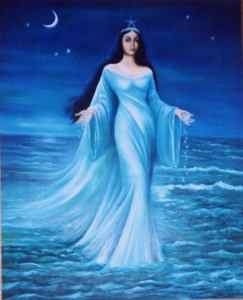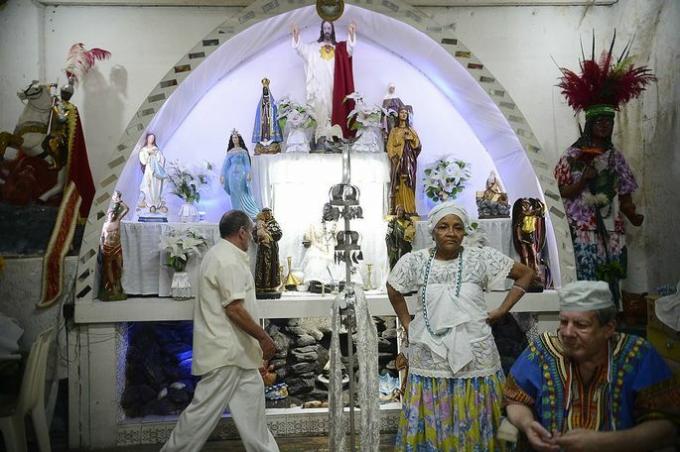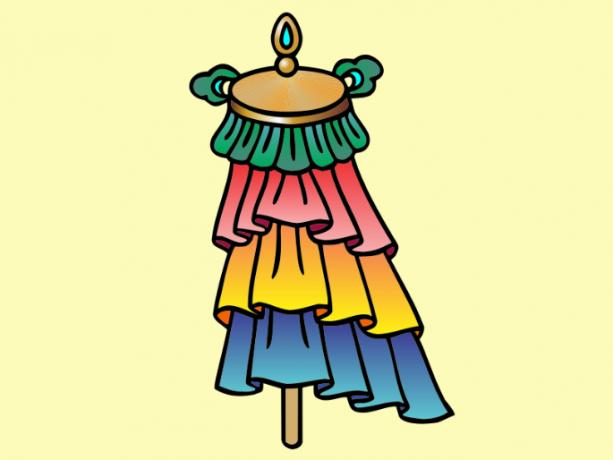
Iemanjá is a female orixá (African deity) of religions Candomblé and Umbanda. Her name comes from the terms of the Yoruba language (Nigero-Congo language) "Yèyé how are you?”, which mean “Mother whose children are like fish”. She is considered the mother of all adults and the mother of deities.
Iemanjá, in fact, is a deity of the river that flows into the sea. She is the daughter of Olokun, the orisha king of the oceans. The river that represents Iemanjá and its history is the Ogun River, located in the state of Oshun, Nigeria.
Iemanjá is the patron saint of fishermen. For African-based religions, such as Candomblé and Umbanda, it is they who decide the fate of all those who enter the sea. She is also considered as the “Brazilian Aphrodite”, the goddess of love to whom lovers resort in cases of romantic disaffection.
In Brazil, the goddess Iemanjá receives different names, including: Dandalunda, Inaé, Isis, Janaína, Marabô, Maria, Mucunã, Princess of Aiocá, Princess of the Sea, Queen of the Sea, Mermaid of the Sea, etc.
The festivals and rituals for Iemanjá
At the February 2 is the day of Yemanjá. In Salvador, capital of the State of Bahia, takes place the biggest popular festival dedicated to Iemanjá.
Thousands of people dressed in white make a procession to the temple of Iemanjá, located on the Rio Vermelho beach, where they leave the presents that will fill the boats that take them to the sea.
In Rio de Janeiro, the festivals in honor of Iemanjá are related to New Year's Eve.
In Candomblés faithful to African origins, worship is performed indoors, in today's worship is outdoors, performed at sea and in lakes, with Iemanjá often represented as a mermaid.
Devotees take to the sea several gifts that are considered refused when they do not sink or when they are returned to the beach.
Among the various offerings to the beautiful and vain goddess, there are flowers, jewelry, perfume bottles, soaps, mirrors and food. The ritual is repeated on other beaches in Brazil.
Celebrations in honor of Iemanjá also take place on August 15th, December 8th and December 31st.
The story of Iemanjá
Legend has it that Iemanjá, daughter of Olokun, the sovereign of the seas, received a potion from her father to help her escape from possible dangers. After a while, Iemanjá marries Olofin-Oduduá, with whom she had ten children, who later became orixás.
By breastfeeding all her children, Iemanjá was left with huge breasts. She felt embarrassed, especially after her husband teasing her for this reason. Angry and sad, Iemanjá decided to leave her husband and go after happiness.
On this journey, she fell in love with King Okerê. To agree to marry him, Iemanjá asked that Okerê never make fun of her huge breasts. However, after getting drunk, the king started making fun of her breasts, and Iemanjá fled.
The king tried to chase her to apologize, but the sea queen used the potion her father gave her to escape her husband. The potion turned it into a river, which drained into the sea.
Afraid of losing his wife, Okerê turned into a mountain to prevent the river from reaching the sea, and Iemanjá could return to him.
However, Iemanjá asked for help from his son Xangô, who with a bolt of lightning, split the mountain in half, allowing the river to follow its path. Thus, Iemanjá met the ocean and became the queen of the sea.
Yemanja and Syncretism
In religious syncretism, Iemanjá corresponds to Nossa Senhora dos Navegantes, Nossa Senhora da Conceição, Nossa Senhora das Candeias, Nossa Senhora da Piedade and Virgin Mary.
See also:
- Umbanda;
- Candomblé;
- dove cute;
- Oxum;
- hopefully;
- Syncretism;
- Candomblé;
- Shango;
- Ajayo;
- Oxossi;
- Definition of Save Jorge;
- Ojoubá;
- eshu;
- ogun;
- African culture.


